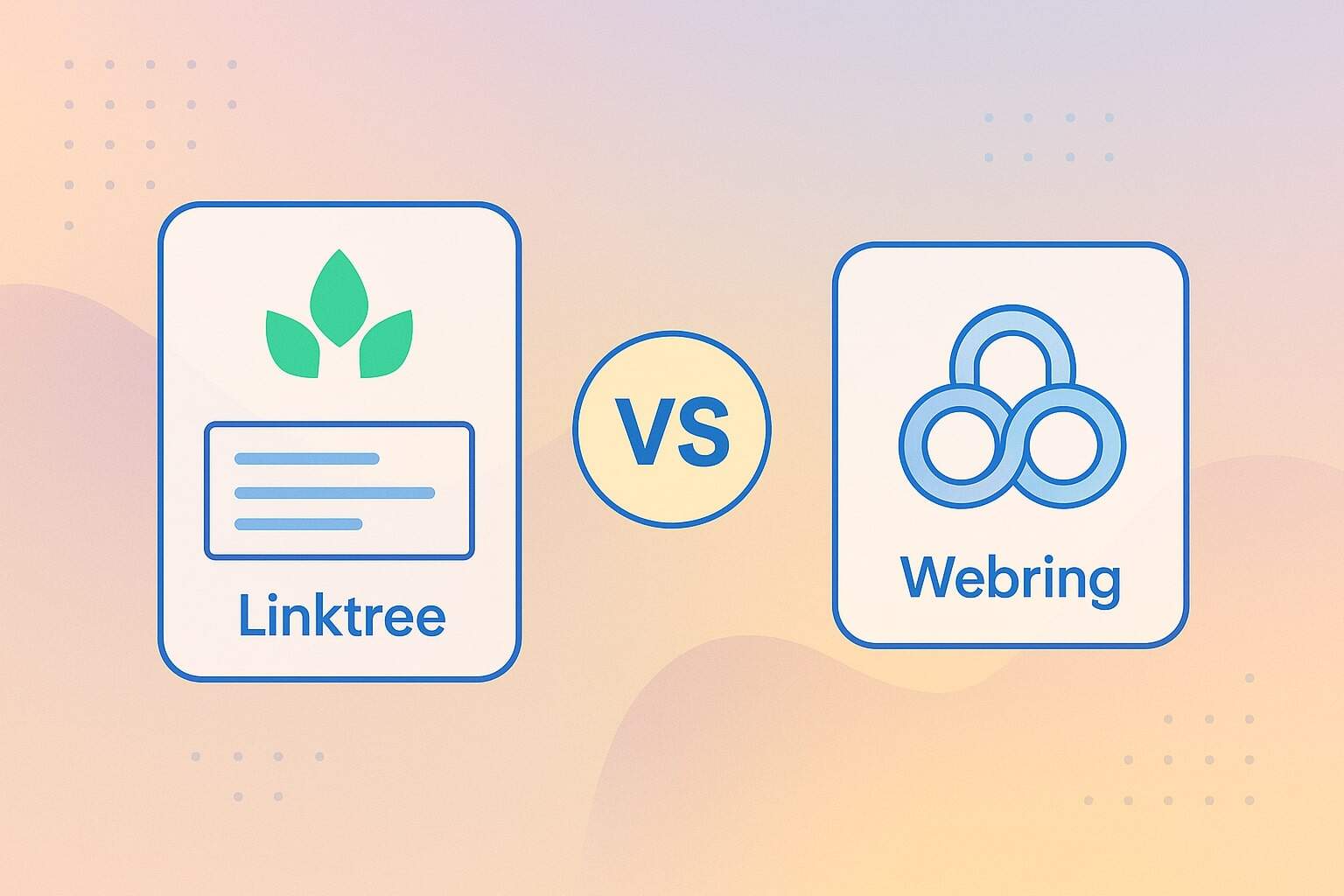Your cart is currently empty!
Tag: indie web tools
-

Modern Webring Tools: What Exists, What Sucks, and What’s Next
Webrings are back. But the tools? Eh.
We’re in a bit of a renaissance moment. People are rediscovering personal sites, hand-built homepages, and the magic of being found through something other than search or social.
But if you’ve tried to actually create or manage a webring lately, you’ve probably noticed something:
Most of the tools out there feel like they haven’t been touched since 1999.
What exists now
Let’s break it down.
- Webring.js and Other JS-based Rings – Lightweight, easy to embed. But there’s zero interface, no moderation tools, and no way to handle scaling or curation.
- Neocities-style Rings – Full retro vibes. Great for the aesthetic, but often clunky to manage and not intuitive for newer users.
- Blogrolls & RSS Aggregators – Technically useful — but not rings. There’s no network flow or shared trail of discovery
- Forum-based Ring Threads – Some forums host informal ring collections (think personal site threads on Reddit or Indie Hackers). Good spirit, but no automation or visual connection.
What kinda sucks
- No dashboards: You can’t see who’s in your ring, how it’s growing, or what people are clicking.
- No discovery: Most rings are just “next / previous” links slapped on footers. There’s no visual sense of place, purpose, or theme.
- No onboarding: Tools assume you already know how this works. New folks? Left in the dust.
- No moderation: Bad actors can sneak in, and ring creators have no real tools to keep quality high.
What’s next — and what we’re building
That’s where Webring Studio comes in. We’re designing tools that:
- Help you start a ring with intention, not frustration
- Let you curate who joins and how your ring is presented
- Give you visibility into your ring’s growth, activity, and vibe
- Offer gentle AI assists for naming, descriptions, and creative nudge moments
- Still keep the spirit of human-powered discovery intact
We’re not trying to build a platform that owns your content.
We’re trying to build a toolset that makes webrings joyful again — and viable in 2025.
Want to help shape what comes next?
We’re building Webring Studio with the indie web — not just for it. Join the waitlist, share your thoughts, and help us make the future of webrings something worth circling back to.
-

Is a Webring Better Than a Linktree? Here’s When It Might Be
Linktree made a splash for a reason. It’s clean. It’s simple. It’s… everywhere.
If you’ve got multiple links to share and only one bio field to do it in, it’s a no-brainer. But what if you’re ready for something a little more you?
That’s where a webring might be the better tool. Not a replacement. Not a rival. Just a better fit in some very specific cases.
When Linktree Wins
Linktree (or any link-in-bio tool) is great when:
- You have a handful of things to share
- You need to update them often
- You want a plug-and-play solution with little setup
- Your audience already expects that format
It’s convenient. Predictable. And good enough for many creators.
But here’s when a webring shines
A webring isn’t just a bunch of links. It’s a context-rich connector. A thread that ties your site to others like it — with shared themes, vibes, or intentions.
Here’s when that beats a generic link list:
1. You care about being found, not just clicked.
Linktrees rely on people already knowing who you are. Webrings help new people stumble onto your work while exploring others in the same ring.
2. You want your links to say something about you.
A webring isn’t just self-referential. It’s expressive. It says: This is the world I belong to.
3. You’re tired of feeling invisible in search and social.
Let’s be real: linktrees don’t do much for SEO. But being part of a thoughtful, themed ring of personal sites? That creates real, organic context – and yes, Google still notices.
That said, if you’re here just to chase backlinks? Don’t.
Ring creators have full control, and spammy vibes will get you turned away fast. Webring Studio is about real connections – not SEO schemes.
.4. You don’t update your links all that often.
Webrings are slower. More ambient. More eternal. They don’t need constant upkeep – just a good fit and a shared spirit.
So, should you ditch your Linktree?
Not necessarily. If it’s working, keep it. But if you’re building a home online – not just a launchpad – then a webring gives you something Linktree can’t:
A sense of place. A hint of soul. And a trail for others to follow.
-

Top Indie Web Tools for Creators in 2025
The indie web is thriving – and if you’re building your own little corner of the internet, the right tools can make all the difference.
This list isn’t about trends or shiny objects. It’s about the tools that help you stay independent, creative, and discoverable in 2025.
Each of these has been vetted for one thing: helping you create a digital home that feels like yours.
Site Builders & Hosts
Neocities – Free
No-frills, HTML-based hosting with a retro heart. Great for full creative control and web revival vibes.
Carrd – Free / $19–$49 per year
A modern, clean site builder that’s surprisingly powerful. Ideal for portfolios, landing pages, and tiny personal hubs.
WordPress.org – Free core / Hosting varies (~$4–$20/month)
The go-to if you want ultimate flexibility. Still powerful and deeply customizable – especially for long-term bloggers.
Bear Blog – Free / $60 per year Pro
A privacy-focused blogging platform with markdown support and minimalist design.
Framer – Free / from $5–$30 per month for Personal plans
Visual design meets web publishing. You’ll need a design eye, but the results are stunning.
Writing & Publishing Tools
Write.as – Free / from $6/month
Distraction-free writing, anonymous publishing, and fediverse support. Loved by minimalists and indie writers alike.
Notion + Fruition – Free
The beloved Notion hack that turns your workspace into a public-facing site. Great for zines, directories, and cozy digital gardens.
Substack – Free (with optional paid tiers)
Best if you want to build an audience with email-first writing. Newsletter + blog hybrid, with strong reach potential.
Buttondown – Free / from $9/month
A lightweight, indie alternative to Substack. Clean, privacy-first, and made for writers.
Discovery & Sharing
Mastodon – Free
The fediverse is growing. Mastodon is the social layer of the indie web – non-algorithmic and deeply communal.
Micro.blog – From $1/month
A beautiful platform that combines short-form posting, blogging, and social discovery without the chaos.
Webring Studio – Free
Curated webrings for creators who care about handmade sites and human-first discovery. Start or join a ring.
Creative & Experimental Tools
Tilde.club – Free
An old-school UNIX shell and community for sharing raw HTML sites and connecting with nostalgic weird web folks.
Blot.im – $6/month
Turn a Dropbox folder (or Git repo) into a blog. No CMS, just you and your files. Shockingly elegant.
Bonus Picks
RSS.app – Free / from $14.99/month
Create RSS feeds from anything. Great for curating custom feeds or syndicating content.
Archive.org – Free
Use the Wayback Machine to back up your site and explore the deep web archives. A timeless essential.
Fathom Analytics – From $15/month
Privacy-focused analytics that don’t track individuals. Great alternative to Google Analytics.
Your Choice
You don’t need fancy. You don’t need big. You just need the right tools to carve your own space.
And when you’re ready to help others find it? We’ll be here – connecting personal sites into something even greater.
